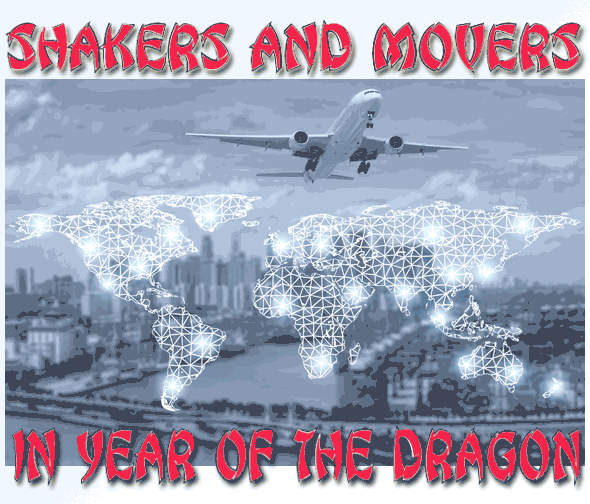 |
FT just published the FIATA Past-Presidents’
wishes for the New Year, but we shall not stop at that: we all know that
the New Year starts on January 1st in many areas of the world, but not
everywhere. In China the New Year starts on February 10th 2024 and this
day will introduce the highly revered Year of the Dragon. As you may have
guessed by some references made in the past, both Sabiha Arend and I were
born in 1952, under the Dragon’s wing. We shall see what this coincidence
brings. I hope this will be a favourable occurrence not only for us, but
also for our readers.
Let us the turn the page to another selected
group of discussants and hear their views. These are personalities who
have been kind enough as to share their thoughts with us every now and
then. FT sent them some questions and received many inspiring answers.
We remain open to hearing more views and comments if available and would
be glad to publish these observations in future.
 For
the time being, we share the following four sets of answers with you,
starting with Nicolette van der Jagt, Director General of CLECAT, the
European federation of freight forwarding and logistics. We asked Nicolette
how she saw the EU landscape developing in 2024, considering it is an
election year also in Europe. For
the time being, we share the following four sets of answers with you,
starting with Nicolette van der Jagt, Director General of CLECAT, the
European federation of freight forwarding and logistics. We asked Nicolette
how she saw the EU landscape developing in 2024, considering it is an
election year also in Europe.
“As the DG of CLECAT I find it imperative
to address the challenges that our industry faces as we approach 2024.
The expectations for the upcoming year are intricately linked to the geopolitical
situation, and the ongoing trends of slowbalization, energy transition,
and inflation will shape global and European trade, necessitating the
logistics industry to showcase resilience once again. Elevated costs and
workforce shortages in the logistics sector intensify concerns about competitiveness,
prompting the sector to navigate troubled waters strategically. The implementation
of the many legislative initiatives in recent years demands careful evaluation,
placing the European business community and its competitiveness at a critical
juncture. The EU's commitment to economic security and sustainable global
growth is reflected in legislative measures compelling shippers and freight
forwarders to report not only financials but also social and environmental
aspects in global sourcing. This necessitates a transformative shift in
companies' systems to align with evolving expectations. Simultaneously,
the anticipated surge in toll prices in some European countries presents
challenges. Governments commendably aim to promote electric transport
through toll discounts for e-trucks, addressing price disadvantages. However,
concerns arise regarding the timing of tax increases for diesel-powered
transport, given the limited availability of e-trucks and infrastructure
challenges for battery-powered international transport. Recognizing this
evolving landscape, CLECAT is in the process of developing a new Memorandum
for the Next European Parliament and Commission. This document will articulate
the expectations of the freight forwarders' association, emphasizing the
imperative for a collaborative approach to address multifaceted challenges
and ensure a resilient, competitive future for the European logistics
industry.”
 Another
lady follows in the order: our good friend Antonella Straulino, who is
Chairwoman of the FIATA Regional Body Europe as well as Secretary General
of CLECAT. Antonella works for FEDESPEDI, Milan. No wonder she was happy
to take respond, considering Fedespedi’s interests in the next couple
of years: “Brussels 2023 was quite momentous for Fedespedi as you
managed to take the 2026 FIATA centennial congress. Other than additional
work, which is understood, what do you expect 2024 will bring to Italian
logistics and Fedespedi in particular?” This is Antonella’s
reply: “2024 will undoubtedly be a busy year for myself and our
youth group, which has received the assignment of the FIATA centenary
congress. It is a source of great satisfaction for us to host the most
important event in our associative world. Entrusting its direction to
those who represent our future is an important indicator: it means trust
and high expectations, which we know will not be disappointed. 2024 will
probably be a difficult year for our members, with a highly uncertain
economic situation globally and its inevitable repercussions. These are
already being felt in parts, even if inflation, for example, has almost
been brought under control again in the last few months, at least in Italy.
On the other hand, I also think that, if there is a category that can
do great, that will be what our members represent, because forwarders
are capable of adapting and finding practical solutions. Our sector is
able to re-invent itself, as the Phoenix is reborn from its ashes, ever
again. This is our true strength. Best wishes to all in 2024 from Fedespedi,
Italy.” Another
lady follows in the order: our good friend Antonella Straulino, who is
Chairwoman of the FIATA Regional Body Europe as well as Secretary General
of CLECAT. Antonella works for FEDESPEDI, Milan. No wonder she was happy
to take respond, considering Fedespedi’s interests in the next couple
of years: “Brussels 2023 was quite momentous for Fedespedi as you
managed to take the 2026 FIATA centennial congress. Other than additional
work, which is understood, what do you expect 2024 will bring to Italian
logistics and Fedespedi in particular?” This is Antonella’s
reply: “2024 will undoubtedly be a busy year for myself and our
youth group, which has received the assignment of the FIATA centenary
congress. It is a source of great satisfaction for us to host the most
important event in our associative world. Entrusting its direction to
those who represent our future is an important indicator: it means trust
and high expectations, which we know will not be disappointed. 2024 will
probably be a difficult year for our members, with a highly uncertain
economic situation globally and its inevitable repercussions. These are
already being felt in parts, even if inflation, for example, has almost
been brought under control again in the last few months, at least in Italy.
On the other hand, I also think that, if there is a category that can
do great, that will be what our members represent, because forwarders
are capable of adapting and finding practical solutions. Our sector is
able to re-invent itself, as the Phoenix is reborn from its ashes, ever
again. This is our true strength. Best wishes to all in 2024 from Fedespedi,
Italy.”
Let us continue with our good friend Glyn
Hughes, the Director General of TIACA. Glyn really is the heart and soul
of his organisation, after his splendid past career in IATA. If there
is one person who can be considered close to our core business, Glyn is
that person. The 2023 summit in Brussels was extremely successful, but
TIACA surely looks forward to a roaring exploit in Miami in 2024. We asked
him what were his expectations in terms of the topics able to attract
the interest of the participants. “Would you agree that we shall
have to deal with greater regulatory pressure and focus on that point,
in particular with regard to the environment?”
 Here is what Glyn’s said, rather concise
and thoughtful: “As we drew a close to 2023 and looked back on a
volatile year which saw significant belly capacity return to the market
whilst demand continued to be soft as a result of geopolitical uncertainty,
high inflation and concern over jobs. These topics were amongst many debated
during the November 2023 TIACA Executive Summit, but what topics will
dominate the coming year? We can unfortunately expect the geopolitical
turmoil to continue with events in the Middle East causing widespread
concern of possible escalation. Additionally, we can expect to see the
increasing focus on environmental issues following 2023 being declared
the warmest year on record and all industries being challenged to improve
their sustainability credentials. Regulatory requirements, such as the
EU CSRD which calls for extensive environmental reporting start to become
effective for certain categories of business from 2024. On the positive
front, the ICAO CAAF/3 meeting, Dec 2023, concluded with a declaration
on behalf of ICAO states that the aviation industry is committed to reducing
its CO2 impact. The meeting agreed a collective position of achieving
a 5% reduction in CO2 by the end of this decade based on increased usage
of Sustainable Aviation Fuel (SAF) or other low carbon or alternative
fuels. That is a 25x increase compared to the 0.2% of SAF used during
2023. The industry’s environmental performance will be one of the
key topics addressed during the next edition of the TIACA Air Cargo Forum,
scheduled for Nov 2024 in Miami. e-Commerce will also feature heavily
as the one area of demand which hasn’t slowed and in fact continues
to demonstrate significant increases. But to be successful and agile in
response to what the world throws at the industry we need to increase
the pace of innovation and technology adoption. These topics will also
feature on upcoming industry agendas.”
Here is what Glyn’s said, rather concise
and thoughtful: “As we drew a close to 2023 and looked back on a
volatile year which saw significant belly capacity return to the market
whilst demand continued to be soft as a result of geopolitical uncertainty,
high inflation and concern over jobs. These topics were amongst many debated
during the November 2023 TIACA Executive Summit, but what topics will
dominate the coming year? We can unfortunately expect the geopolitical
turmoil to continue with events in the Middle East causing widespread
concern of possible escalation. Additionally, we can expect to see the
increasing focus on environmental issues following 2023 being declared
the warmest year on record and all industries being challenged to improve
their sustainability credentials. Regulatory requirements, such as the
EU CSRD which calls for extensive environmental reporting start to become
effective for certain categories of business from 2024. On the positive
front, the ICAO CAAF/3 meeting, Dec 2023, concluded with a declaration
on behalf of ICAO states that the aviation industry is committed to reducing
its CO2 impact. The meeting agreed a collective position of achieving
a 5% reduction in CO2 by the end of this decade based on increased usage
of Sustainable Aviation Fuel (SAF) or other low carbon or alternative
fuels. That is a 25x increase compared to the 0.2% of SAF used during
2023. The industry’s environmental performance will be one of the
key topics addressed during the next edition of the TIACA Air Cargo Forum,
scheduled for Nov 2024 in Miami. e-Commerce will also feature heavily
as the one area of demand which hasn’t slowed and in fact continues
to demonstrate significant increases. But to be successful and agile in
response to what the world throws at the industry we need to increase
the pace of innovation and technology adoption. These topics will also
feature on upcoming industry agendas.”
We thought to conclude with our valued colleague
and friend Bob Keen, Secretary General of FIATA. By the way, he also was
born under the Dragon rule in 1952. We asked Bob to reflect on the year
we had just finished and the one ahead of us: “2023 was a year of
mixed experiences for BIFA’s members. Do you think 2024 will have
a negligible impact on the evolving landscape of British freight or do
you expect any significant development?”
In reality, whilst we were asking Bob Keen,
who is still FIATA’s Secretary General and well known to our readers,
the question was more appropriately taken by his successor in Britain,
BIFA’s Director General Steve Parker, who is the Chairman of FIATA’s
Customs Affairs Institute. This is Steve’s reply and I applaud its
concise completeness.
 “In 2024, the world economy is expected
to outperform previous projections according to Goldman Sachs Research,
with worldwide GDP forecasted to expand to 2.6% next year, although recovery
in the logistics sector may be slower to catch up. Feedback from members
of the British International Freight Association indicates that this year
has been a reset after the Pandemic, and we shouldn’t expect massive
change in 2024 with little growth in the first half of next year. S&P
Global’s 2024 outlook report states that supply chain resilience
will remain important in 2024 and key to staying adaptable and nimble
when planned or unplanned disruption occurs. 2023 has seen the return
of more traditional logistics patterns of a cyclical nature with more
consistent ordering patterns, and BIFA expects these things to carry over
into 2024. We also expect ocean and air transportation capacity to adjust
to more traditional levels throughout 2024. However, while the return
of cyclical and traditional patterns is a relief, we should remember that
disruption can happen quickly and often unexpectedly - even in a traditional
market and trends like re-shoring and near-shoring, particularly in Southeast
Asia, the Indian sub-continent, Turkey, North Africa and Mexico, will
continue to contribute to the shift in the flow of freight. The ever increasing
focus on corporate responsibility and sustainability will continue its
rise up the business agenda next year and BIFA will continue to help its
members to establish a baseline for both their and their clients’
carbon footprints while identifying areas for potential emissions reductions.
To conclude, my view is that any real growth is likely to have to wait
until 2025.”
“In 2024, the world economy is expected
to outperform previous projections according to Goldman Sachs Research,
with worldwide GDP forecasted to expand to 2.6% next year, although recovery
in the logistics sector may be slower to catch up. Feedback from members
of the British International Freight Association indicates that this year
has been a reset after the Pandemic, and we shouldn’t expect massive
change in 2024 with little growth in the first half of next year. S&P
Global’s 2024 outlook report states that supply chain resilience
will remain important in 2024 and key to staying adaptable and nimble
when planned or unplanned disruption occurs. 2023 has seen the return
of more traditional logistics patterns of a cyclical nature with more
consistent ordering patterns, and BIFA expects these things to carry over
into 2024. We also expect ocean and air transportation capacity to adjust
to more traditional levels throughout 2024. However, while the return
of cyclical and traditional patterns is a relief, we should remember that
disruption can happen quickly and often unexpectedly - even in a traditional
market and trends like re-shoring and near-shoring, particularly in Southeast
Asia, the Indian sub-continent, Turkey, North Africa and Mexico, will
continue to contribute to the shift in the flow of freight. The ever increasing
focus on corporate responsibility and sustainability will continue its
rise up the business agenda next year and BIFA will continue to help its
members to establish a baseline for both their and their clients’
carbon footprints while identifying areas for potential emissions reductions.
To conclude, my view is that any real growth is likely to have to wait
until 2025.”
This expert preview ends my conversation
with some of our regular guests. Not difficult to see that uncertainty,
even more than usual, takes the front stage in their thoughts. We live
in a complex period, there is no denial.
This being said, in so many occasions it
has been extremely rare to sit and watch the world spin undisturbed in
harmony, or at least in decent balance. Everyone is screaming that European
logistics and consequently the economy will be seriously affected by the
problems in the Red Sea. In my country journalists seem to have just discovered
the importance of logistics and the Suez Canal with it. I imagine similarly
in America the tale is told about Panama for other reasons.
This is all very true, but in my view we
should take these alarms with a grain of salt. In my own life span I have
seen at least three serious crises situated within, before or after the
Suez Canal. What happens there now is indeed a problem, it is surely an
event that will be remembered in another fifty years, but keeping fingers
crossed it is not the end of the world, at least so far. Our economies
will move forward and adapt, we just need all hands on deck and look into
the future with hope.
In fact, at FT we are much more
concerned by another issue that inexplicably filters to the backburner
too soon: the symptoms of the rapidly mounting climate change and the
global consequences this transformation will trigger, both within our
environment and our society. These phenomena will probably not erupt in
2024, probably we shall have sufficient rainfall this year, as the year
of the Dragon is traditionally generous with rain, but I am scared that
sooner or later the water falling from the sky will be too scarce, with
the exception of more and more frequent, destructive storms.
Mankind had developed a well-deserved confidence
in science and technology. This is surely positive, but this does not
authorise us to throw away the common, traditional and wise behaviours
that our farmers and highlanders developed over centuries of careful observation
and care for the territory. If we look at what we have done in the last
five or six decades, perhaps we have made more than one mistake in our
approach to the environment and it would be wise to recognise these mistakes
and take measures to make amends.
My wish for this new cycle is that the rain
associated with the Dragon silently, quietly falls on earth to make it
clean, fertile and teaming with the life of all the plants and animals.
We live here for a period: we do not own the planet and we should always
keep this in mind.
Kung Hei
Fat Choi!
Marco L. Sorgetti
|





 Vol.
23 No. 4
Vol.
23 No. 4